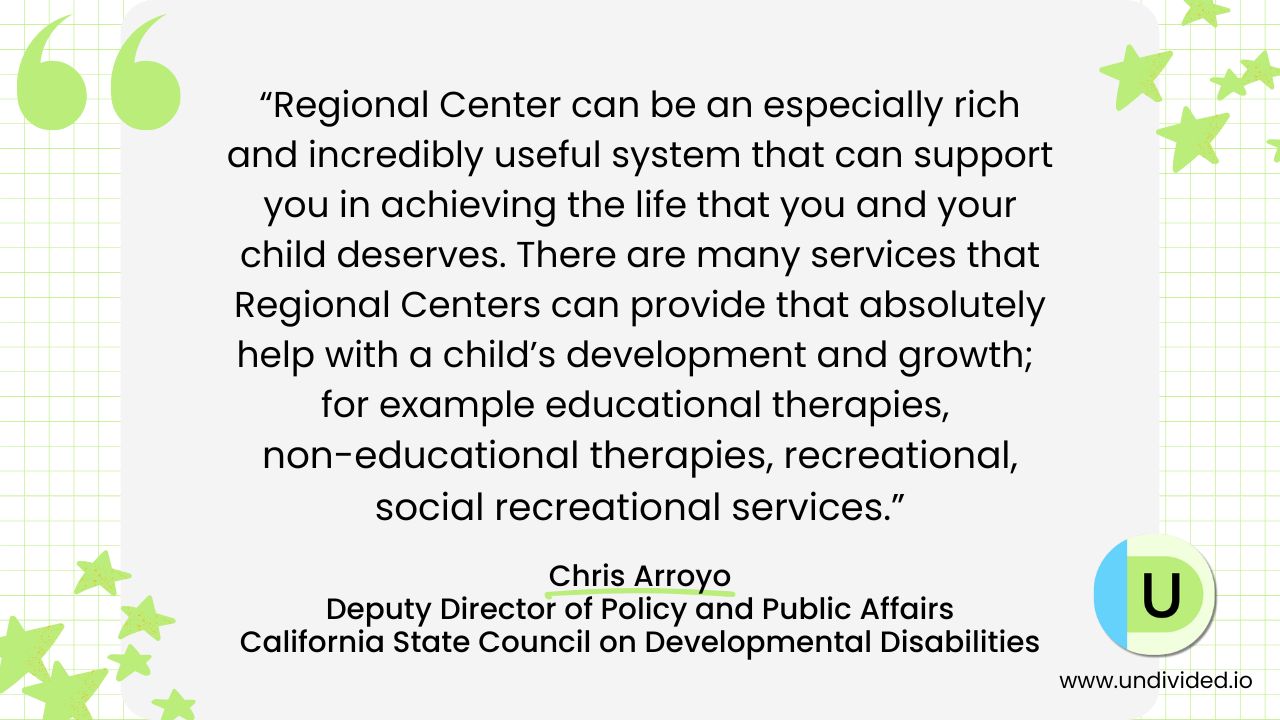
Regional Centers are a statewide network of local agencies that serve children and adults with developmental disabilities. They provide assessments, therapeutic and other services, and case management services. For children under age three, Regional Center provides early intervention services to children with a diagnosed developmental disability and to children who are at risk of developmental delay. After age three, eligibility requires a diagnosed developmental disability that constitutes a substantial disability that is expected to continue indefinitely. A substantial disability is defined as a disability that results in “significant functional limitations” in three or more areas.
In the fall of 2024, California Governor Gavin Newsom signed into law a series of bills designed to improve the lives of individuals with developmental disabilities and their families. Below are key updates that impact families accessing Regional Centers.
Gain access to Undivided’s comprehensive resources and receive our weekly newsletter.
1. Improved record access, transparency, and accountability
AB 1147 (“Disability Equity, Transparency, and Accountability Act of 2024”) goes into effect on January 1, 2026. Regional Centers will be subject to the California Public Records Act, which gives applicants and recipients of Regional Center services (or their representative) the right to access their records.
This act also makes changes to improve transparency and accountability. For example, changes to the Lanterman Act will provide increased oversight of Regional Center operations and performance, including prohibiting Regional Center employees from accepting gifts over $15 per year, and prohibiting Regional Center senior staff from hiring relatives. The act also requires the State Department of Developmental Services (DDS) to develop and implement a master plan for developmental services.
2. In-home respite services for foster families
Regional Center may fund in-home respite services to provide parents relief from the ongoing care and supervision of their child with developmental disabilities. These services are allocated to the extent that a child’s care needs exceed those of a typically developing child.
Under SB 1197 (“In-home respite services”), foster children who also receive Regional Center benefits cannot be prohibited from receiving in-home respite services from Regional Center because they receive Aid to Families with Dependent Children-Foster Care (AFDC-FC) benefits. The new law also updates terminology—for example “resource family”—which aligns with the state’s intent to provide in-home respite services to caregivers of “dual agency” children.

3. Potentially higher rates for service providers
In 2019, legislators required the State Department of Developmental Services (DDS) to conduct a study of the rates they pay Regional Centers for community-based services. AB 2423 (“Developmental services: rates”) requires DDS to review the rate model annually, which may result in higher rates for service providers. This law comes into effect on July 1, 2025.
4. Measures to help Regional Center clients avoid lack of a caregiver or housing
AB 329 (“Developmental services”) makes changes to Regional Center processes that create caregiver and housing safeguards. One change is that before a Regional Center client’s 22nd birthday, their individual program plan (IPP) should include a caregiver succession plan in case anything happens to the caregiver.
The bill also extends the circumstances for when a Regional Center director can allow payments for rent to include the risk of homelessness.
For additional information related to California legislation and disabilities, see New California Legislation Impacting Families of Kids with Disabilities. And check out the related resources below for more on Regional Center and accessing other funding sources.
Join the Undivided Community to get more resources like this in your inbox
100% free | Curated for you

A Navigator is your Partner at each turn
*Currently offering Navigator Kickstarts to residents of California






